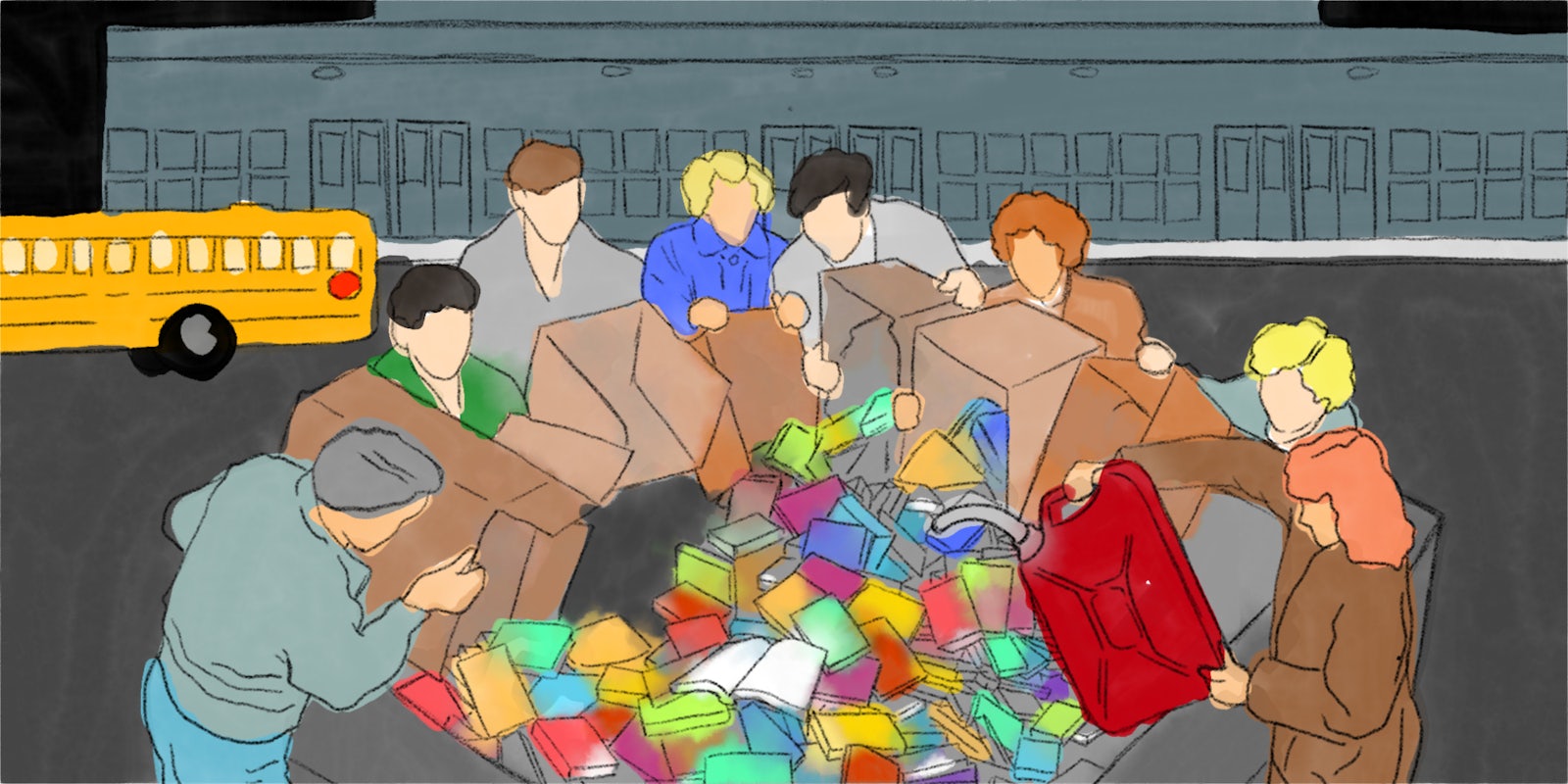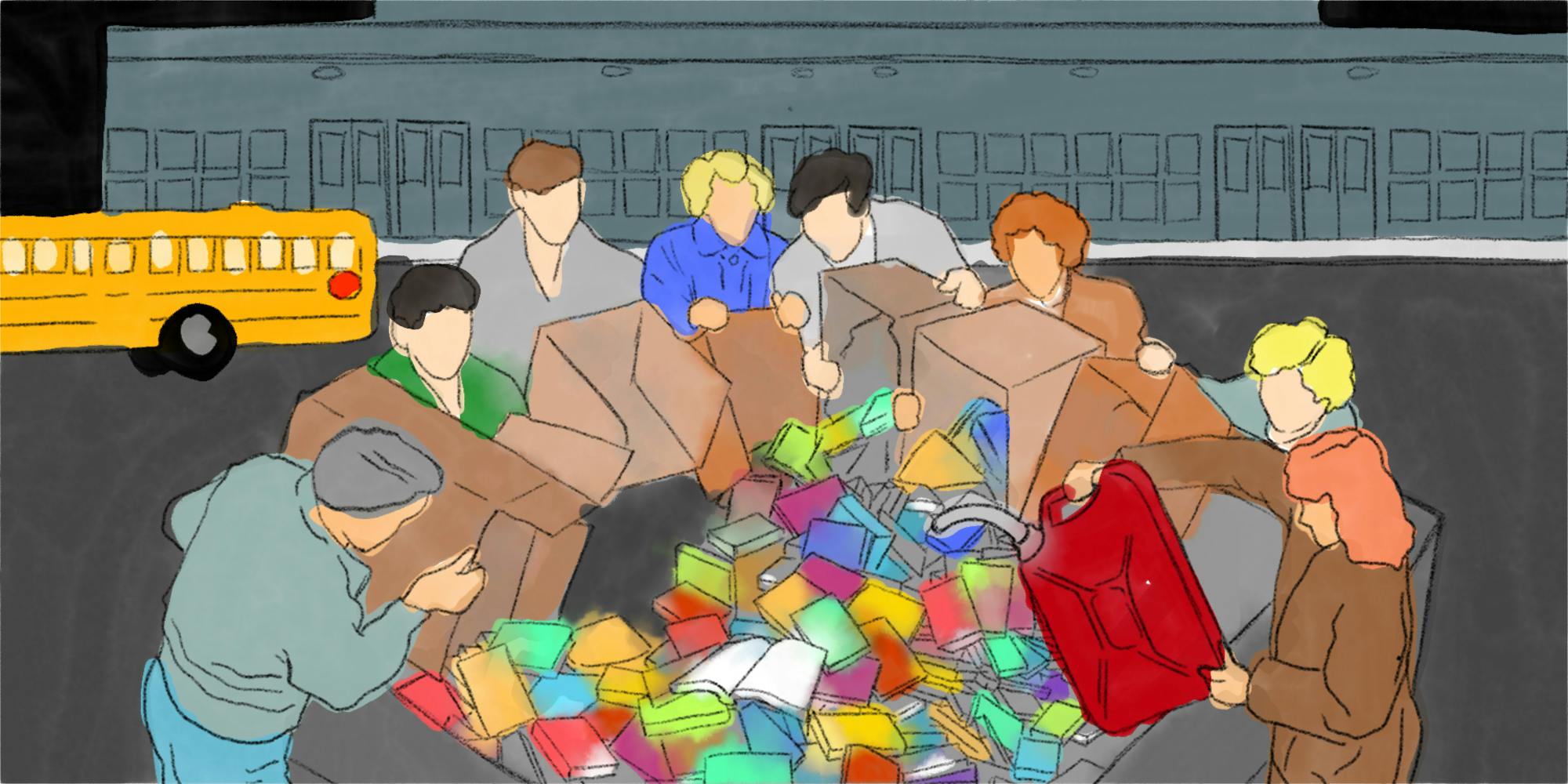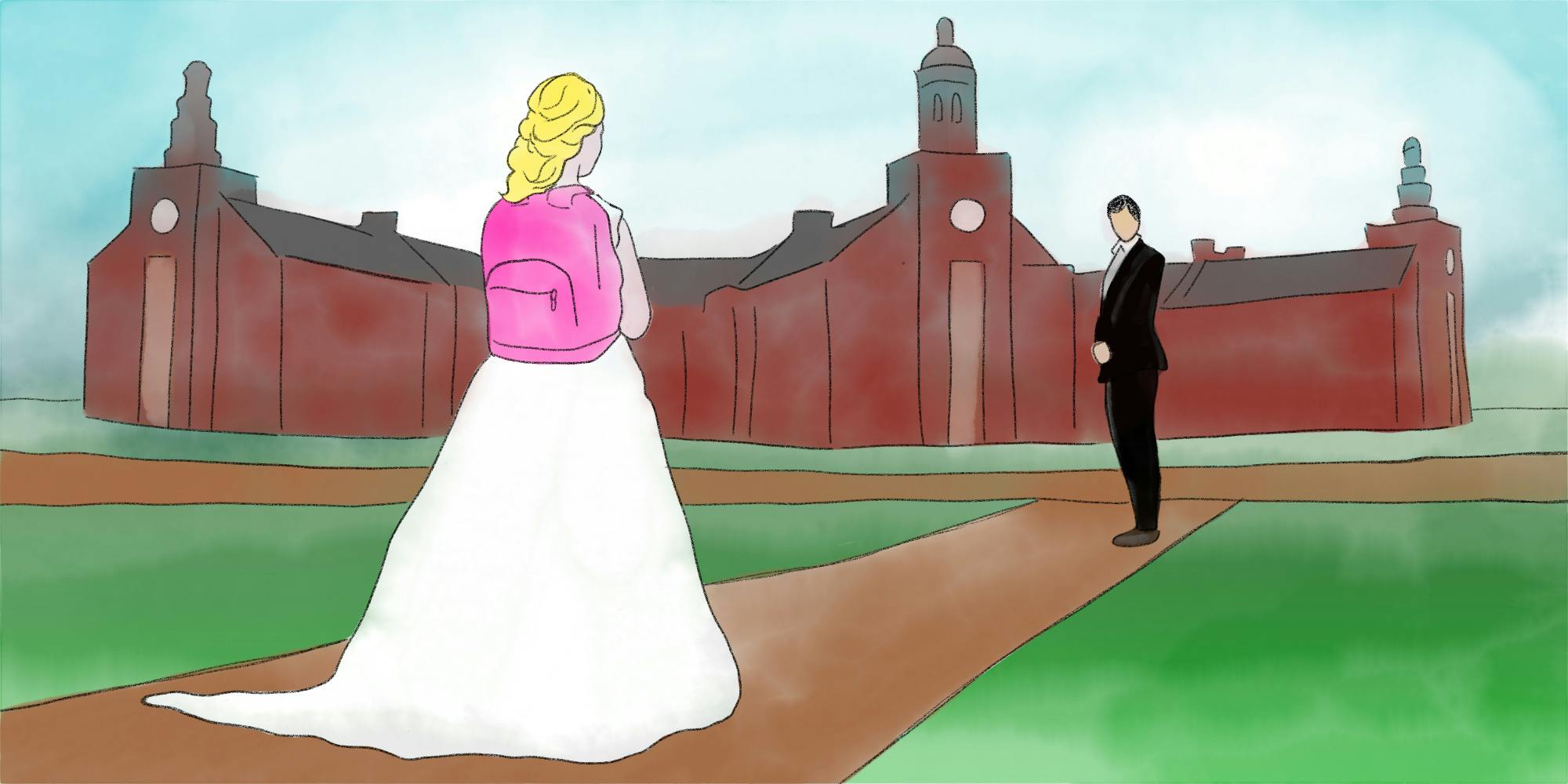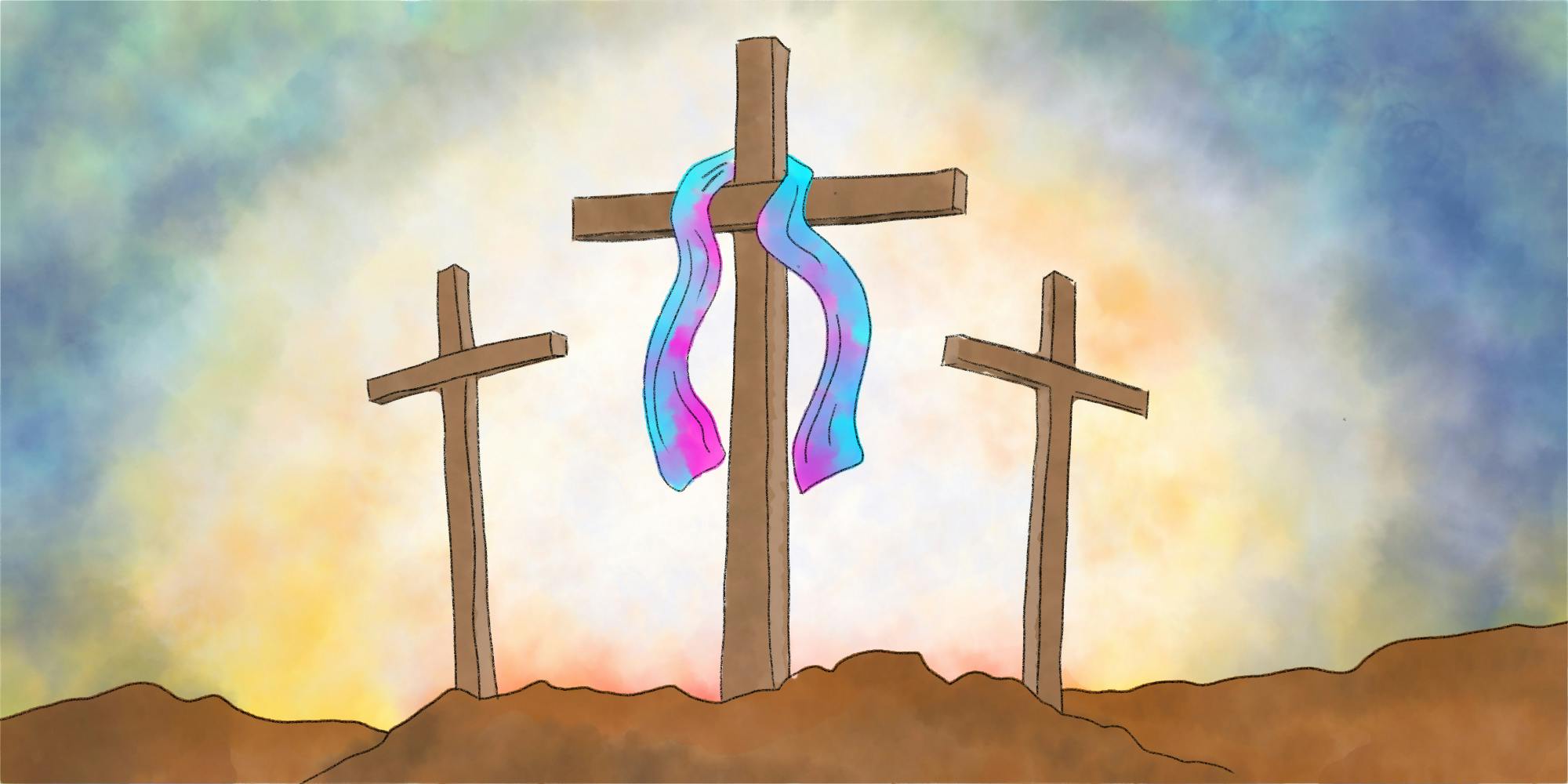At the end of Ella’s freshman year of high school in 2021, she was stuck in online classes when she discovered that books were being removed from her school without any notice to students.
Concerned over the lack of communication and censorship, Ella and her friend Alyssa formed the Banned Book Club at Vandegrift High School in Leander, Texas.
For Ella and the other members of the Banned Books Club, it was disheartening to hear from teachers that books they related to were pulled off the shelves.
“Having adults say that this is inappropriate, that this isn’t something that we should be discussing in the classroom, it feels like they aren’t appreciating a side of your story and they’re not recognizing it how they should be,” Ella told the Daily Dot.
Today’s students are seeing access to certain titles stripped away as right-wing fear-mongering over children is forcing its way into the classroom.
According to Pen America, 1,648 unique titles have been banned across the country over the past year. Forty-one percent of the books banned in the last year contain LGBTQ themes and characters, which leaves many students bereft of representation in literature.
Using these books as a key part of an ongoing attack against LGBTQ individuals and their rights is an engineered moral panic.
“It’s been the last several years that we’ve seen book bans and efforts to restrict access to books take off. Some of these bans do seem related to a big movement in trying to shut down speech and conversation around race and gender,” Aadika Singh, legal director for the American Civil Liberties Union (ACLU), told the Daily Dot.
According to Pen America, some of the most popular banned books from this year have been Gender Queer: A Memoir by Maia Kobabe, All Boys Aren’t Blue by George M. Johnson, Out of Darkness by Ashley Hope Perez, and The Bluest Eye by Toni Morrison.
To further understand the breadth of book banning across the country, the Daily Dot requested records from a dozen school districts and obtained hundreds of documents containing complaints from parents and community members, and discussions on the book material. These records helped showcase the reasoning behind school districts’ decisions to ban books and the unfounded fear racing through parents.
These records reveal the sweeping concern festering in parents across the country over-grooming present in children’s literature.
Anxiety over a false effort to indoctrinate students to have a pro-LGBTQ worldview is at the root of these bans.
Gender Queer is a graphic memoir about the author’s journey to adulthood as they explore sexuality and gender identity. This book and others containing LGBTQ characters and themes have been criticized and labeled as pornographic. Finding these books in school libraries has led to distrust between parents and school faculty.
“Who actually approved this book in our school library? It calls into question whether they should be working in a school setting to deem this appropriate reading material. Whoever is responsible should immediately be terminated,” one parent wrote in an email to the superintendent at Yorktown Central School District in upstate New York.
Another Yorktown parent emailed the superintendent about the book The Hate U Give by Angie Thomas, which is about a teenage girl grappling with police brutality after she sees her friend killed by a police officer. The parent’s complaint says the book has “horrible content and vulgar language of killing cops.”
“It’s not just this year. These attacks have become really aggressive and voluminous … starting in the Trump administration,” Singh of the ACLU said.
Those arguing to remove the books say that it’s not an attack on LGBTQ rights but that explicit content has a pattern of appearing in books with LGBTQ characters and themes.
“It has nothing to do about the sexual orientation of any of the characters in any of the books. It’s just unfortunate that so many that are targeted to LGBTQ youth do seem to have very explicit sexual content in them,” Tiffany Justice, co-founder of Mom’s for Liberty, told the Daily Dot.
Moms for Liberty is a nonprofit organization that supports parental rights in schools. While it claims to be nonpartisan, the group’s focus has been on right-wing topics. The organization, formed in January 2021, says it has 195 chapters across the country with over 70,000 members.
Moms for Liberty first gained national headlines when members went to school board meetings condemning mask mandates in schools. This year, many parents garnered attention by going to school board meetings and reading out loud scenes from books they find inappropriate.
Justice explained that when news of explicit books was making its way across the country, Moms for Liberty members began to survey their own children’s school libraries for any content of concern.
“It became very apparent that there was an orchestrated effort to push these books into younger and younger grade levels across the country,” Justice said.
But when the Daily Dot followed up with Moms for Liberty to ask if there are any books unrelated to LGBTQ topics they pushed to ban over concerns regarding explicit content, Moms for Liberty did not respond.
The idea that inappropriate material is being pushed in schools is a clear indicator of a moral panic sweeping the nation.
An essential element of moral panic is the idea that there is a real threat caused by the misconduct of a particular group, Noah Smith told the Daily Dot.
Smith is a Communications and Programs Associate at United Nations Global Compact Network USA. He recently graduated with a master’s degree in Human Rights Studies from Columbia University where his research focused on moral panics in the digital age and their effect on the LGBTQ community.
Smith said there is “a feeling of fear spread among many people that some ‘evil’ threatens the well-being of society, essentially an exaggerated outburst of public concern over the morality or behavior of a group within society.”
Smith told the Daily Dot that the fear around books containing LGBTQ characters and themes is a further extension of the attacks on the community.
“These contemporary sex panics around LGBTQ books tap into America’s deepest fears about the need to protect innocents from the threat of evil; the presumed threat to many Americans is the LGBTQ community,” Smith said.
In Nampa, Idaho, panic around these books was so high that 22 books that already required parental consent to be checked out were banned without a full review.
Singh and her team have read through many of the books that were banned in Nampa, and she believes there is no reason to label these books as pornographic.
“We’ve gone through these books to try to identify what the heck could be offensive,” Singh told the Daily Dot. For the book Drama by Raina Telgemeier, labeled as pornographic by a Nampa parent, Singh made note of two pages: One page has a boy saying that he’s gay and another page depicts two boys kissing on stage for a play.
“Somehow that is considered pornographic,” Singh said.
When reviewing the books in Nampa, the school district relied on a review from Common Sense Media, a site that provides age-appropriate reviews for parents. Common Sense gave Drama two out of five stars for sexual content, with five stars signifying that a book has heavy sexual content. The site agrees with Singh’s assessment that the book simply depicts gay characters and shows one kissing scene during a play.
Despite experts finding little evidence in pornographic claims, parents across the country echo Justice’s sentiments in emails to their respective school districts.
“This is what our tax dollars are paying for, it’s filth and appalling that it is in our school libraries,” one parent wrote to Ronald Hatter, superintendent of the Yorktown Central school district when complaining about the books Lawn Boy, The Hate You Give, Gender Queer, and Out of Darkness.
“The school’s role is to set a positive and healthy example for our youth,” another parent wrote in a reconsideration form to the Harlem School district about the book Beyond Magenta: Transgender Teens Speak Out by Susan Kuklin. “It is not the school’s place to provide students with material that contains sexual content.”
While attacking LGBTQ literature, some parents have blamed diversity initiatives. In the Yorktown Central school district, parents are questioning the district’s Diversity, Equity and Inclusion (DEI) task force.
“I am now concerned that DEI may in fact be in our schools as others are claiming,” one parent wrote to the district. “These books are part of an agenda that is being pushed under the guise of DEI.”
The parent then went on to refer to DEI as racist and that it aims to abolish the nuclear family and degrade Christian values.
While parents are the most vocal groups petitioning for these books to be removed, there are plenty of parents who are confused by this campaign.
“No one benefits from banning the learning/discussion of disparate topics in our society except the parents who are too ignorant or afraid to actually do the job of parenting,” a resident of Yorktown wrote to the superintendent.
Many parents of former Yorktown high school students sent complaints to the district about removing books.
“We know that the complaints leading to much of this ‘controversy’ are in fact part of a national propaganda campaign. We should all be greatly concerned, not about the content of these books but the concerted attacks on literary freedom,” a parent of Yorktown High Graduates wrote to the district.
While parents fight over what is and isn’t appropriate material for school libraries, the people at the heart of the issue, students, often don’t get a say.
The Vandegrift Banned Book club now has 20 members who have read a total of nine banned books together.
Now a junior in high school, Ella says that reading these books has given her a better understanding of the world around her.
“A lot of these stories have scenes that we’ve been suppressing and ideas that have been underrepresented for a long time,” Ella told the Daily Dot. “I think these books are tools to help us understand the world around us.”
Most conversation around book banning is led by parents, but Ella told the Daily Dot that she hopes to see students be given more input.
“We really need to start asking students what they want from these books and what they think about them in order to have a truly fair argument.”
Ella’s favorite of the banned books the club read together was the Handmaid’s Tale by Margaret Atwood. The club also read Out of Darkness by Ashley Hope Perez and wrote on their Instagram that the book was “nothing short of educational.”
“The first-hand perspective of this novel is one that no classroom lecture can come close to replicating, making this story critical to understanding the whole story of racism in our state and nation,” the club posted on Instagram.
“What’s so sad about the book bans is that these books save lives,” Singh of the ACLU said. “They’re life promoting because they help kids feel less alone to see someone that looks like them and identifies like them.”





